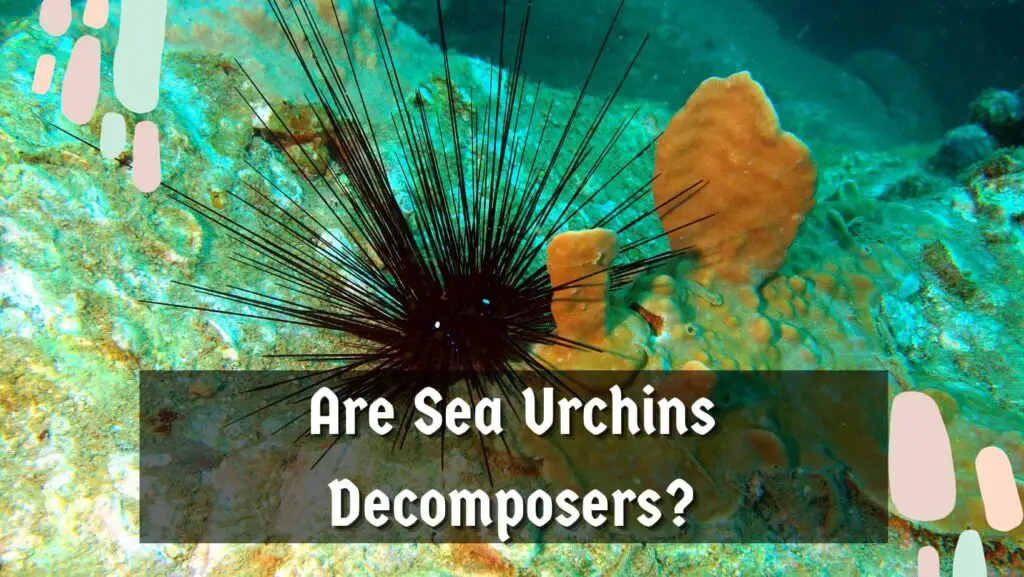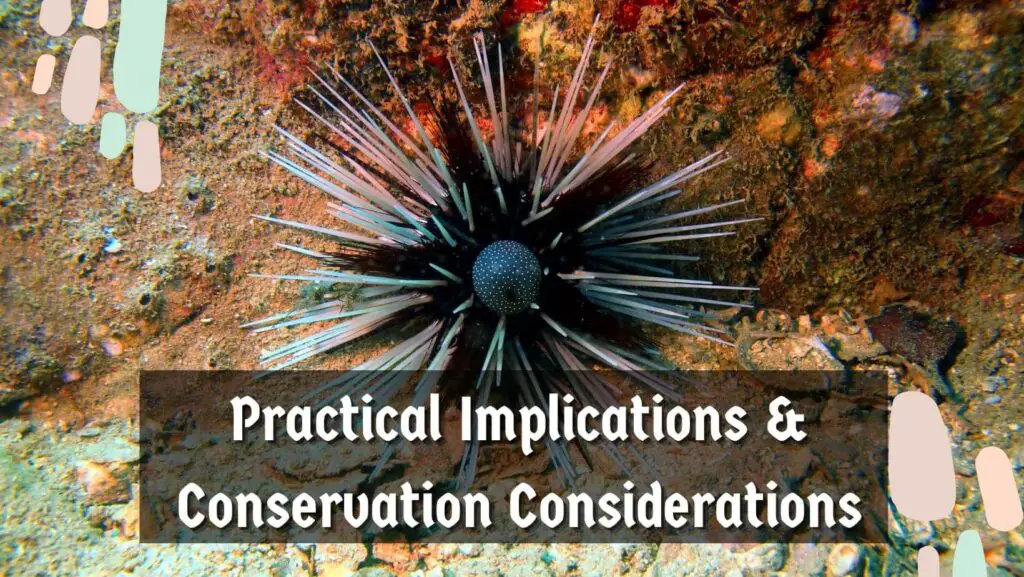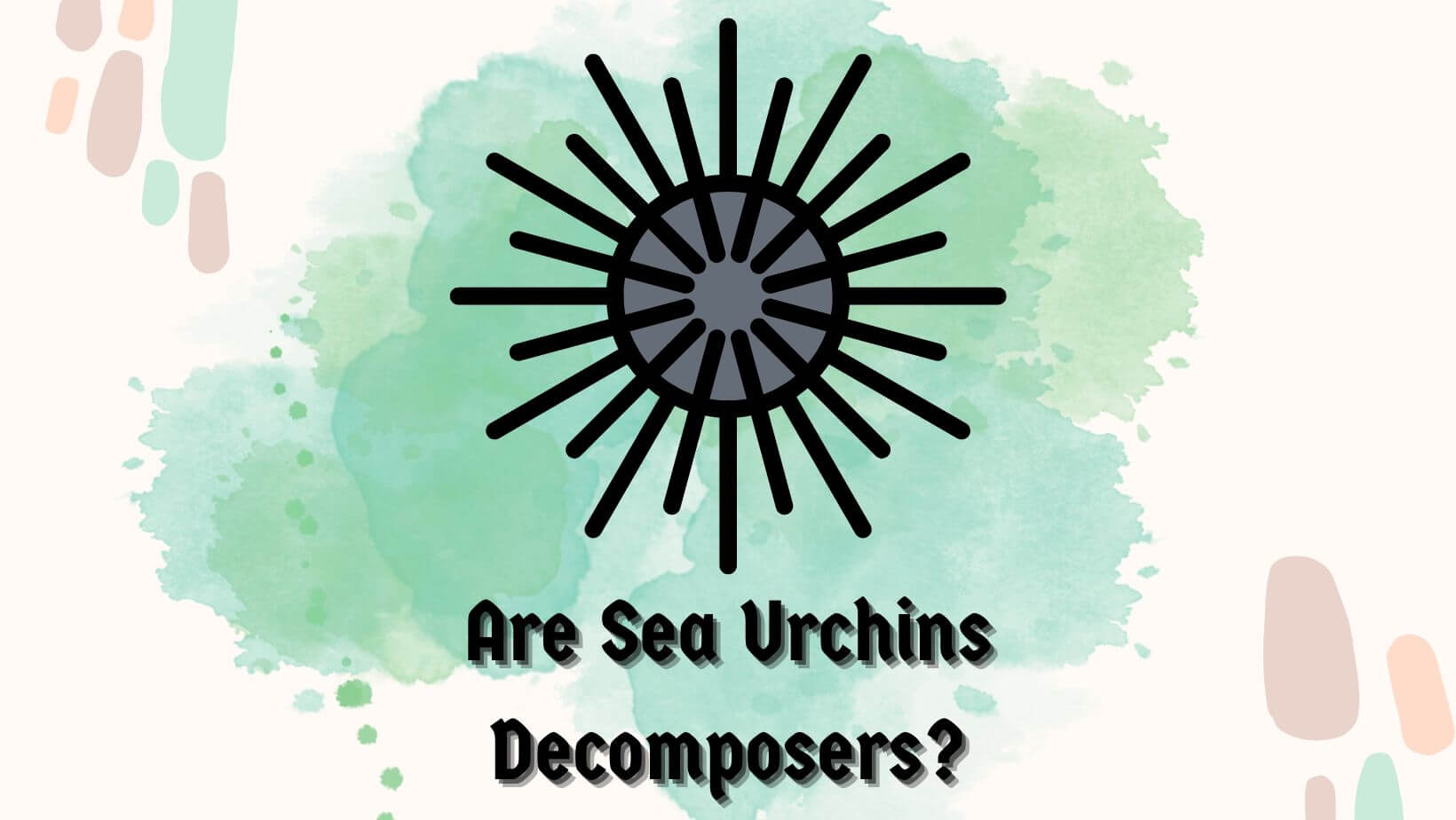There is no doubt that Sea urchins are fascinating creatures that inhabit our oceans and play a crucial role in the delicate balance of marine ecosystems. Today, I’ll help you dive deep into the world of sea urchins to explore an intriguing question:
Are sea urchins decomposers? If you also want to embark on this journey & uncover the truth behind their ecological role and potential contribution as decomposers, read this article thoroughly.
Table of Contents
Are Sea Urchins Decomposers?

Yes, sea urchins are Decomposers. Even though sea urchins primarily function as herbivores, they also play a secondary role in decomposition. Sea urchins break down dead organic matter, recycling nutrients into the ecosystem through their feeding & waste management activities.
Believe it or not, researchers have also observed Sea urchins consuming detritus and decaying organic matter in their surroundings. Sea urchins continuously break down dead organisms through their feeding activities, which further aid in the decomposition process.
This decomposition process is important as it releases valuable nutrients into the ecosystem, fostering nutrient cycling. If you look at recent studies, you will find that the waste produced by sea urchins contains significant amounts of nutrients, including nitrogen, phosphorus, potassium, calcium, and magnesium.
These nutrients are important for us and essential for the growth & survival of other organisms within the ecosystem. When our little sea urchins consume organic matter & excrete waste, they also release these valuable nutrients making them available for uptake by other plants & animals.
Also, sea urchins are known to keep kelp forest and algal community populations in check by continuously grazing on them. This further recycles the nutrient while promoting Marine diversity and ecology.
In addition, you should know that the decomposition process facilitated by sea urchins enhances nutrient cycling within marine ecosystems. Overall, the breakdown of Dead organic matter by sea urchins subsequently helps release nutrients back into the Marine environment, promoting the overall productivity and health of the ecosystem.
Interactions with Other Decomposers
Sea urchins are not the only creatures in the Marine world involved in decomposition processes. If you observe them closely, you will witness them interacting with bacteria & fungi to form collaborative relationships, further enhancing decomposition efficiency.
Also, it shouldn’t be surprising to know that sea urchin waste provides a suitable environment for microbial communities to thrive. Bacteria & fungi are known to utilize the waste of sea urchins as a energy source, assisting in further breaking down and releasing additional nutrients into the ecosystem.
No wonder this interplay between sea urchins & decomposer microorganisms highlights the intricate web of interactions within marine ecosystems. Not only these kinds of interactions are crucial for the efficient breakdown of organic matter but also nutrient cycling.
Case Studies & Experimental Evidence
Many researchers and studies have explored the role of sea urchins in their respective environments. Numerous studies also give us valuable insight regarding the role of sea urchins as decomposers and their impact on nutrient cycling within marine ecosystems.
A recent study observed the decomposition rates of organic matter in the presence & absence of sea urchins. You might not believe the results, but it surprisingly revealed that areas with sea urchins exhibited faster decomposition rates & higher nutrient availability compared to areas without sea urchins.
To gain further knowledge, another study was done by CE Yorke, where they investigated the influence of sea urchin populations on the decomposition of kelp detritus.
Since the first study already demonstrated the role of sea urchins as a decomposer, this study particularly found that as sea urchin densities increased, the decomposition rates of kelp detritus also increased.
I hope you find all these studies helpful because this research provides further evidence of sea urchins’ important role in decomposition processes within marine ecosystems.
Practical Implications & Conservation Considerations

It is important to understand the decomposer role of sea urchins as it can also have a practical application in various fields. If you look at the aquaculture system, you can use sea urchins for waste management, as it will further help maintain the water quality while reducing the accumulation of organic matter.
Sea urchins’ ability to break down dead organisms and organic waste is very helpful because it contributes to the overall health & sustainability of the aquaculture operation. In addition to this, sea urchins have already shown potential for bioremediation efforts as well.
They not only have the ability to decompose organic matter but also can aid the restoration of degraded Marine ecosystems. Consider introducing sea urchins in areas with excess organic waste or dead organisms to promote ecosystem regeneration and enhance other decomposition processes.
We must work towards the conservation effort to protect these Marine creatures’ population and their ecological role as herbivores and decomposers. We should consider implementing regulations on harvesting practices as well as establishing Marine protected areas to ensure further the preservation of their habitat and the maintenance of their crucial ecosystem. You should know that conservation measures benefit sea urchins and contribute to the overall health & resilience of marine ecosystems.
Conclusion
After reading this article, I hope you now know that sea urchins are not only herbivores but also play a crucial secondary role as decomposers within marine ecosystems. You should also know that sea urchin feeding habits & waste management activities can contribute to the breakdown of organic matter while facilitating nutrient recycling.
I have tried to help you understand their interactions with decomposer microorganisms. Sea urchins are undoubtedly important for our ecosystem as they enhance the efficiency of decomposition processes within marine environments.
I have given my best to give you all the information you need on the question: are sea urchins decomposers? If you find this article helpful, then consider sharing it. Your share will help people understand the importance of sea urchins as a decomposer and also helps them learn about their feeding habits & waste management activities.
Do check my other helpful guide on sea urchins as well. See you in the next post, till then, take care & goodbye.
